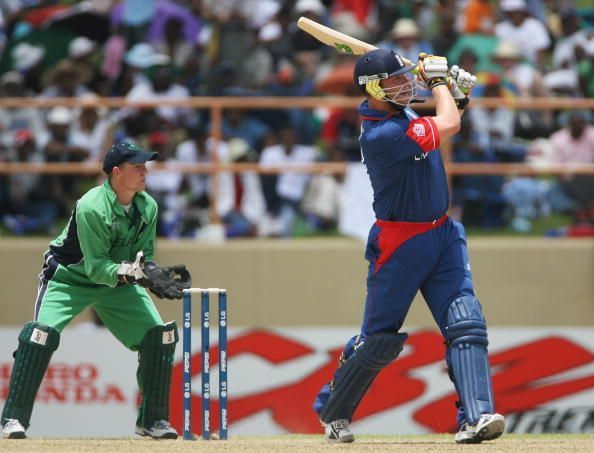
World Cup History: Andrew Flintoff - Emulating his all-around predecessor
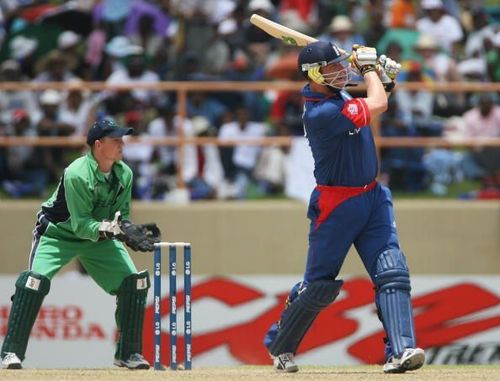
Cricket throws up some uncanny coincidences. Two of England’s most explosive allrounders did not perform, particularly with the bat, in the World Cup as well as their status in the international game warranted. Their figures in the premier tournament are remarkably similar. Ian Botham and Andrew Flintoff, burly, multi-faceted, dominant, attacking batsmen, penetrative pacemen, brilliant catchers, came to the fore only with the ball in cricket’s showpiece event, and that too sporadically.
Remarkably similar World Cup records of Ian Botham and Andrew Flintoff
Let us examine their record in the World Cup. In 22 matches Botham scored 297 runs at an average of 18.56 and strike-rate of 62.39 with one half-century and a highest of 53. In 18 matches Flintoff scored 263 runs at an average of 18.78 and strike-rate of 67.95 with one half-century and a highest of 64.
Botham took 30 wickets at an average of 25.40, economy-rate of 3.43 and a best of four wickets for 31 runs. Flintoff took 23 wickets at an average of 23.21, economy-rate of 3.93 and a best of four wickets for 43 runs. Flintoff’s statistics are almost a replica of Botham’s. These two giants are not ranked amongst the leading allrounders of the World Cup, because of their underwhelming batting record.
Flintoff was always hailed as a successor to Botham. If anything, he is even bigger in size than the legendary Somerset superstar. But his early forays were not so successful, leading to cynicism and smirks in several quarters. In fact his huge frame and bulk were a cause for mirth and there were serious doubts about the emergence of another Botham. Flintoff’s poor performances in the 1999 World Cup only confirmed the opinion of the sceptics. The big boy looked a misfit on the international stage.
A moderately successful 2003 World Cup
Gradually Flintoff found his feet. He had established himself by 2003. After the walkover to Zimbabwe was an undistinguished game against Holland, in which he was out for a duck. He scored 21 off the trundlers from Namibia and took two wickets for 33 in his 10 overs.
In their first match of consequence, versus Pakistan, Flintoff shared a 42-run sixth-wicket partnership in 10 overs with Paul Collingwood. He got 26 of those runs. As the Pakistani batting crumbled, Flintoff had Younis Khan snapped up by Alec Stewart behind the stumps, and later shattered the stumps of big-hitting top-scorer, last man Shoaib Akhtar. Flintoff returned with two wickets for 37 runs off 9 overs. England registered a 112-run win.
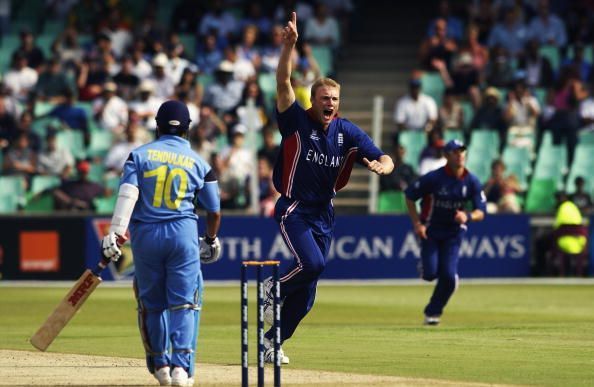
When things got tougher, Flintoff came up with a stellar allround performance in adversity. As the incomparable Sachin Tendulkar and Virender Sehwag gave India a flying start, raising 60 runs inside 10 overs, Flintoff struck. He caught Sehwag off his own bowling. Sourav Ganguly helped Tendulkar maintain the momentum, but Flintoff dismissed the maestro for 50. The Indian batsmen had the measure of almost every other bowler, but Flintoff was most economical. He conceded just 15 runs off his 10 overs, with two maidens, his best analysis of the tournament. India posted 250 for nine wickets.
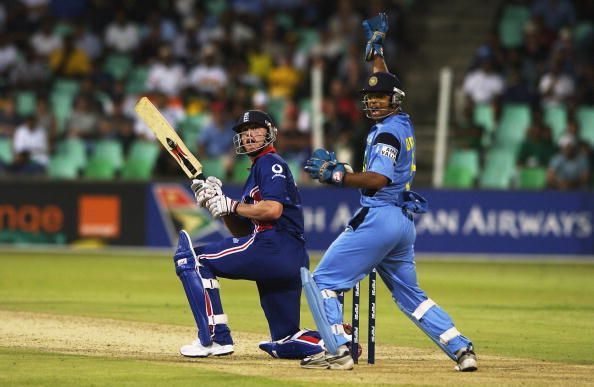
England batted under lights and never looked like mounting a challenge. Flintoff came in at 62 for five in the 19th over with left-arm paceman Ashish Nehra in devastating form. He attacked the bowling as wickets fell all around him. Andy Caddick helped him in a 55-run ninth-wicket stand. Flintoff finally fell for 64, his highest score in the World Cup, having struck 5 fours and 3 sixes, and negotiated 73 deliveries. Soon England were all out for 168.
The dramatic clash with Australia was dominated by Andy Bichel but the start provided no inkling of the excitement to follow. The English openers Marcus Trescothick and Nick Knight hoisted 66 on the board before the 10th over was up. Then the histrionics began. In the space of eight overs the scorecard read 87 for five. Bichel had accounted for four of these. Flintoff joined Stewart and the two added 90. He became another Bichel victim, caught behind by Adam Gilchrist for 45. England finished on 204 for eight at the end of 50 overs. Bichel ripped out seven wickets for 20 runs in his 10 overs.
Australia themselves were in strife at 135 for eight in the 38th over when Bichel allied with Michael Bevan in a desperate partnership. They battled hard and brought it down to two runs required off the last over. Flintoff had not taken a wicket in his 9 overs, having conceded 21 runs. He was handed the ball by skipper Nasser Hussain. The first two balls produced no run, then Bichel took a single. Off the fourth delivery Bevan got a boundary to clinch a gripping encounter.
England were now out of the tournament. Personally it was a fairly satisfying performance by Flintoff, devoid of any brilliance or heroics. He had got some runs and a few wickets at a very economical rate but the spark was missing.
Reckless behaviour and a few sparks with the ball in the 2007 World Cup
It was a catastrophic opening clash with New Zealand in the 2007 World Cup. Flintoff was dismissed first ball, failed to get a wicket and England were trounced.
The disasters continued for Flintoff. A late night binge got him into troubled waters in more ways than one, and he was dropped for the picnic with Canada. He was back to take on Kenya, probably a chastened man and picked up the wickets of top-scorer Steve Tikolo and old warhorse Thomas Odoyo.
It was time for Flintoff to enjoy himself at the expense of surprise entrants into the super-eight league, Ireland. He scored 43 and shared an 81-run fifth-wicket stand with Collingwood in 17 overs. Then he had fun with the ball, bagging four wickets for 43 runs in 8.1 overs, his World Cup best.
The game with Sri Lanka was a humdinger. Flintoff bowled well, capturing the wickets of opener Upul Tharanga, Chamara Silva and Chaminda Vaas, giving away just 35 runs in his 10 overs. Sri Lanka posted 235 runs. When Flintoff came in to bat, the match hung in the balance with England on 126 for four after 30.5 overs. But he was dismissed for 2, and the team lost by 2 runs when the overs ran out despite a late-order fightback.
Australia were in supreme form, and it was a grievous outing for Flintoff as well as his side. There was respite against Bangladesh and an opportunity for Flintoff to display some fireworks off his chunky bat. But again there was a cataclysm against South Africa.
The last super-eight match was nothing but Brian Lara’s farewell, with neither side in a position to advance. Flintoff bagged the wickets of openers Chris Gayle and Devon Smith after they had piled on the runs. Lara was run out, and Flintoff had a hand in the run out of the last two batsmen as the West Indies were dismissed for a round 300. England snatched a thrilling one-wicket win off the penultimate delivery, but Flintoff’s contribution was just 15.
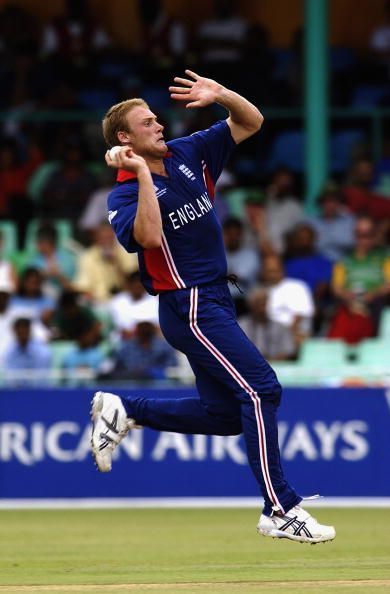
It was a largely colourless act by Flintoff. He was the backroom boy rather than a star performer, a lacklustre effort in a lacklustre team. Overall his 23 wickets at an average just above 23, and an economy-rate just below four runs an over look impressive on paper but do not reflect the fact that he failed to make the sort of impact that an allrounder of his calibre should have. It was indeed the Botham story all over again.
Andrew Flintoff’s World Cup record:
Matches: 18, Highest Score: 64, Runs: 263, Average: 18.78, Strike-rate: 67.95, Fifty: 1, Catches: 6
Wickets: 23, Average: 23.21, Best: 4/43, Economy: 3.93